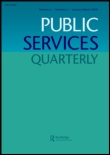Background:
 I was recently honored to be asked to write a technology column for an upcoming special issue of Public Services Quarterly. The issue’s theme is next generation public services, and I went with a title of “The case for home-grown, sustainable next generation library services”. While the column won’t be published until December, I feel it relates to a lot of discussion going on in libraryland right now and wanted to make it available as soon as possible.
I was recently honored to be asked to write a technology column for an upcoming special issue of Public Services Quarterly. The issue’s theme is next generation public services, and I went with a title of “The case for home-grown, sustainable next generation library services”. While the column won’t be published until December, I feel it relates to a lot of discussion going on in libraryland right now and wanted to make it available as soon as possible.
The journal is usually limited to subscriber-only access. But the journal’s publisher, Taylor & Francis, allows me to post a preprint version online for free access. ‘Preprint’ means the article as it existed before undergoing peer review. But being essentially an opinion piece, peer review didn’t end up changing much. Only a few cosmetic changes were made, and so the actual content of this version is about 99% identical to what will be published in the December issue.
I’d like to give special thanks to Chris Guder, the journal’s technology column editor. His guidance helped craft this from a very (very) rough first draft into something I’m quite proud of. I think of it as my manifesto.
The links:
It’s a bit lengthy at 4400 words, so I converted the column into a PDF and formats for various ebook readers if you so desire:
Here’s an informal abstract:
I have grave concerns about libraries’ reliance on third party vendors in some areas. We gain the ability to provide new and cutting edge services to our users, but at what cost to sustainability? If a vendor disappears we’re suddenly out the service and the money we paid along the way. And sometimes we place the library in a very dangerous position as a precarious middleman. I talk about mobile services, ebook lending, terms of use issues, and potential new models for next generation public services. We can build services both by libraries and for libraries to provide a sustainable future of services.
Note that I wrote this column before Amazon introduced their Kindle library lending feature through Overdrive, and I’ll probably write a follow-up post about that soon.

 Last Friday I received an email from Amazon with a fairly innocuous subject line: “New Kindle Personal Documents Features”.
Last Friday I received an email from Amazon with a fairly innocuous subject line: “New Kindle Personal Documents Features”.